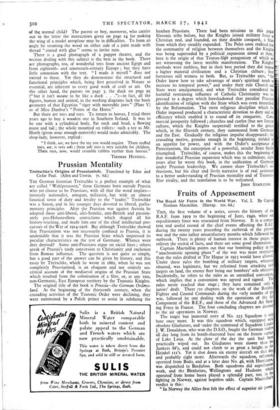Prussian Mentality
Treitschke's Origins of Prussianistit. Translated by Eden and Cedar Paul. (Allen and Unwin. 7s. 6d.)
THE German historian Treitschke is perfect example of what are called " Wahlpreussen," those Germans born outside Prussia who yet choose to be Prussians, with all that the word implies— intensely nationalist, arrogant, militarist, but with an almost fanatical sense of duty and loyalty to the " leader." Treitschke was a Saxon, and in his younger days devoted to liberal, parlia- mentary principles. After the Prussian war against Austria he adopted those anti-liberal, anti-Semitic, anti-British and passion- ately pro-Hohenzollern convictions which shaped all his history-teaching, and made him one of the chief intellectual pre- cursors of the War of 1914-1918. But although Treitschke showed that Prussianism was not necessarily confined to Prussia, it is undeniable that it was the Prussian State which impressed its peculiar characteristics on the rest of Germany. Whence were they derived? Some anti-Prussians argue on racial lines ; others speak of Prussia's tardy conversion to Christianity and exclusion from Roman influence. The question is not quite so simple, but a good part of the answer can be given by history, and this essay by Treitschke, which he wrote in 1862, when he was not completely Prussianised, is an eloquent and not entirely un- critical account of the mediaeval origins of the Prussian State which resulted from the colonisation of a Slav, or, at any rate, non-Germanic, East European territory by the Teutonic Knights. The original title of the book is Prussia—the German Ordens- land. At the beginning of the thirteenth century, when the crusading activities of the Teutonic Order were declining, they were summoned by a Polish prince to assist in subduing the heathen Prussians. There had been missions to this mei Slavonic tribe before, but the Knights joined military force to Christian zeal, and founded, on their double conquest, a State from which they steadily expanded. The Poles soon realised that the community of religion between themselves and the Knighe was being superseded by a political expansion aimed at them; here is the origin of that Teuton-Ste- antagonism of which we are witnessing the latest terrible manifestation. The Knights' methods were ruthless, but in their best period they did impose a higher material civilisation and a Christian culture ; thew fortresses still witness to both. But, as Treitschke says, "the Order knew how to take advantage of man's spiritual needs to increase its temporal power," and under their rule Church and State were amalgamated, and what Treitschke considered the harmful restraining influence of Catholic Christianity was re- pressed to a degree which foreshadowed that peculiar Prussian identification of religion with the State which was even intensified by the Reformation. The stern religious discipline which the Order imposed produced a characteristic devotion-to duty and an efficiency which enabled it to round off its conquests. Com. mercial prosperity followed ; churches and castles (but not literary culture, which the Knights suspected) testified to the genius which, in the fifteenth century, they summoned from Germany and the East. Gradually the religious impulse disappeared; the crusading motive, genuine enough in the beginning, yielded to an appetite for power, and with the Order's acceptance of Protestantism, the conception of a powerful, secular State finally triumphed. Treitschke, of course, makes this the beginning of that wonderful Prussian expansion which was to culminate, eight years after he wrote this book, in the unification of Germany under Prussian leadership.. We cannot- share Treitschke's en- thusiasm, but his clear and lively narrative is of real assistance to a better understanding of Prussian mentality and of Teutonic- Slav rivalry, and the translation is to be welcomed.
JOHN STAPLETON.


























 Previous page
Previous page